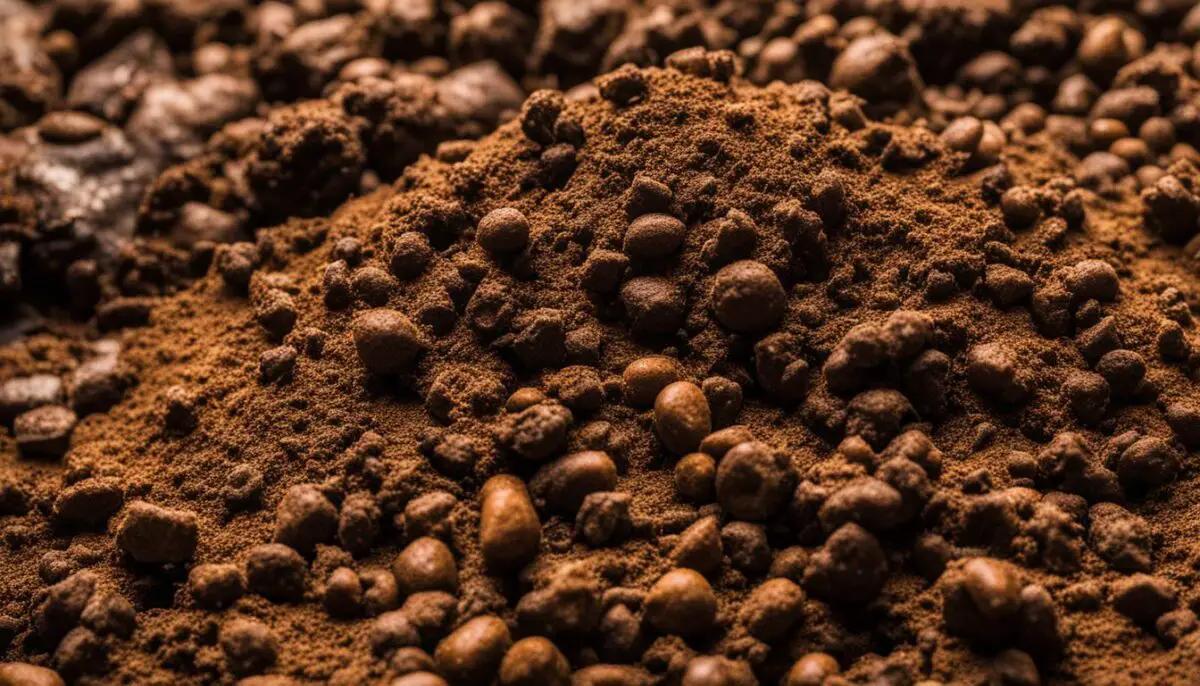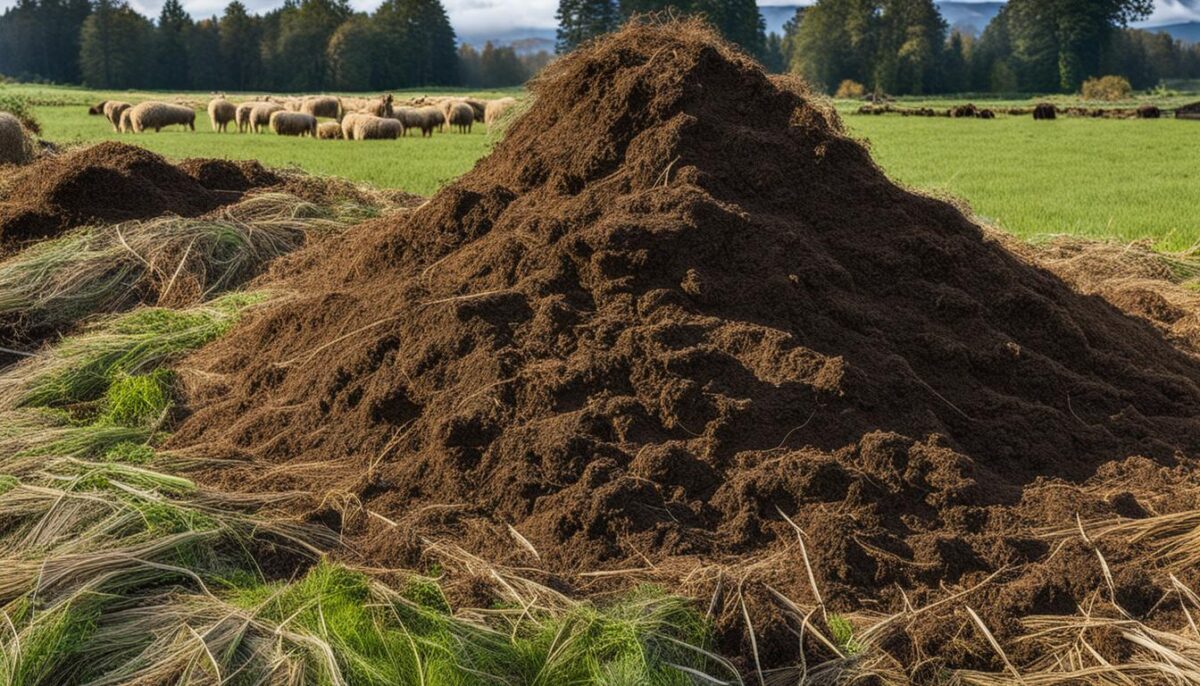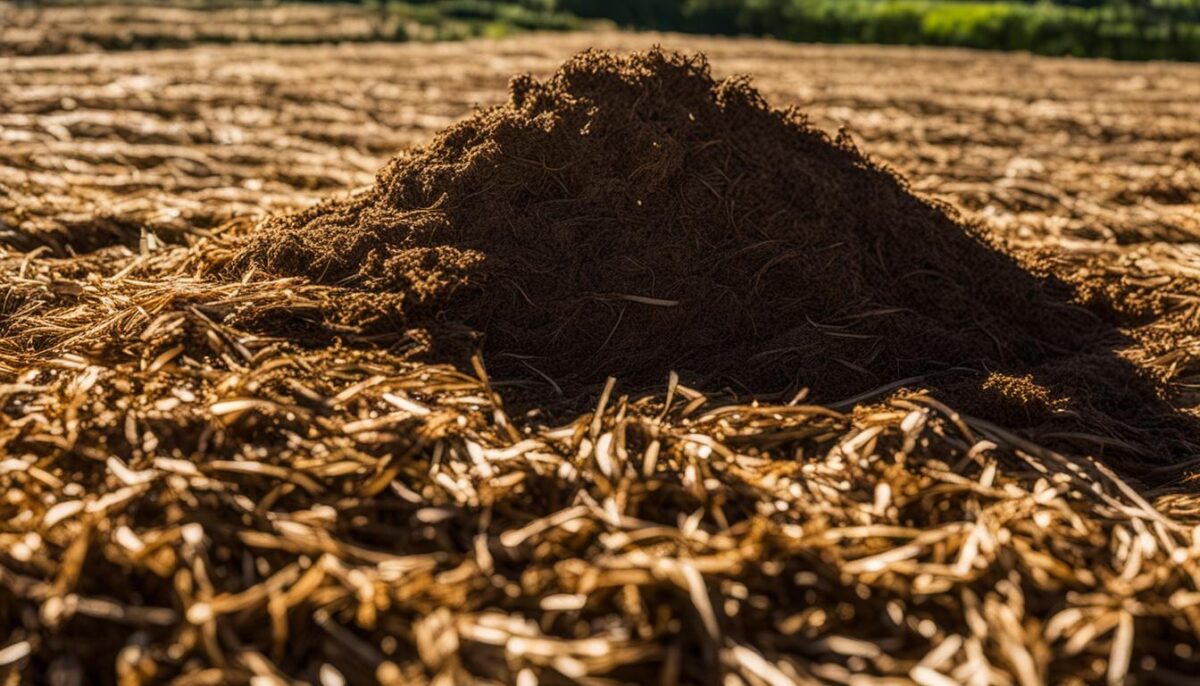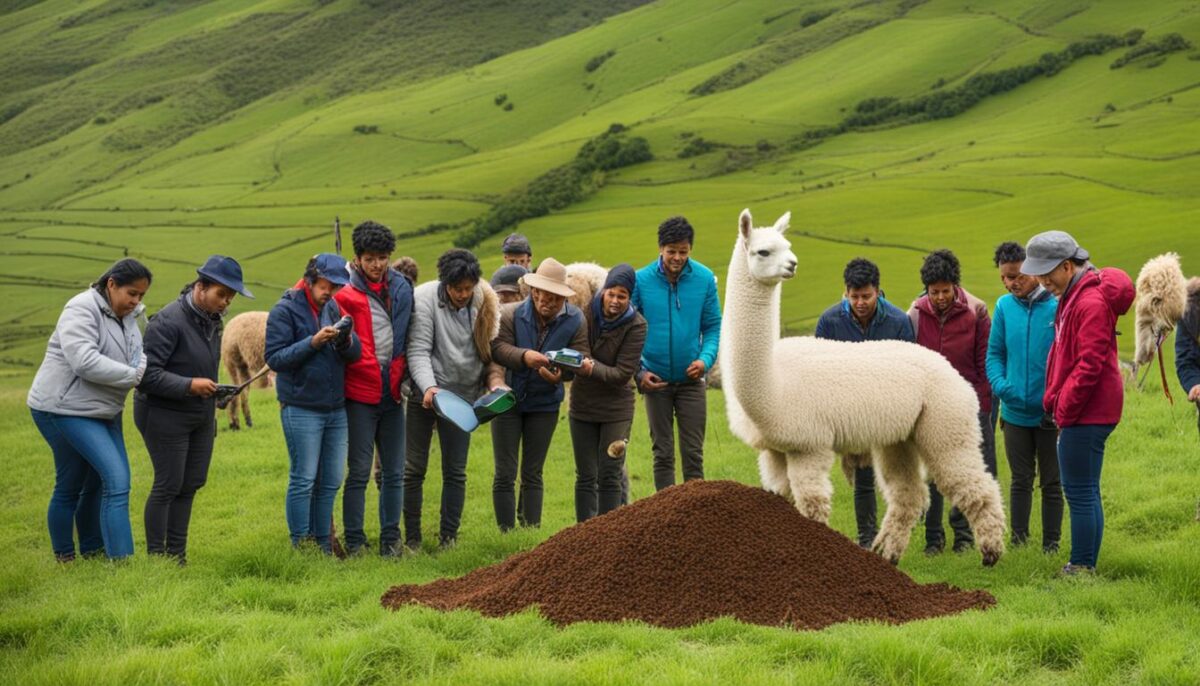Alpaca poop, also known as alpaca manure or droppings, holds significant value in the agricultural industry. Alpaca waste is highly sought after for its nutrient-rich properties, making it an excellent organic fertilizer. The worth of alpaca poop can vary depending on various factors, including market demand, quality, and quantity.
Key Takeaways:
- Alpaca poop is a valuable organic fertilizer in the agricultural industry.
- The price of alpaca manure can vary based on market demand, quality, and quantity.
- Alpaca waste is sought after for its nutrient-rich properties.
- Its use as a natural fertilizer promotes sustainable farming practices.
- Proper composting and packaging techniques can increase the market value of alpaca manure.
The Benefits of Alpaca Manure
Alpaca manure, also known as alpaca droppings, offers a range of benefits that make it a valuable resource in agriculture. When determining the value of alpaca poop, it’s essential to understand the advantages it provides.
High Nutrient Content
Alpaca manure is rich in essential nutrients such as nitrogen, phosphorus, and potassium. These nutrients are vital for plant growth and can significantly improve soil fertility. The high nitrogen content in alpaca poop promotes lush green foliage and robust plant development.
Odor and Decomposition
Unlike other types of manure, alpaca droppings have a low odor profile, making them more pleasant to handle and use. Additionally, alpaca manure readily breaks down and decomposes, resulting in faster nutrient release and absorption by plants. This quick decomposition process enhances soil health and contributes to a healthy soil ecosystem.
Organic and Sustainable
Alpaca manure is an organic and sustainable alternative to chemical fertilizers. It aligns with the growing demand for environmentally friendly farming practices. By using alpaca poop as a natural fertilizer, farmers can reduce their reliance on synthetic inputs and minimize potential harm to the environment.
Improves Soil Structure
When alpaca manure is applied to the soil, it helps improve its structure. It enhances soil water retention capabilities, reduces erosion, and promotes better nutrient absorption by plants. As a result, the soil becomes healthier and more conducive to plant growth, leading to improved crop yields.
Table: Nutrient Content Comparison
| Nutrient | Alpaca Manure | Cow Manure | Chicken Manure |
|---|---|---|---|
| Nitrogen (%) | 2.5 | 1.0 | 1.6 |
| Phosphorus (%) | 1.5 | 0.5 | 1.0 |
| Potassium (%) | 1.0 | 0.3 | 1.2 |
Table: A comparison of nutrient content in alpaca manure, cow manure, and chicken manure. Note the higher nitrogen, phosphorus, and potassium levels in alpaca manure, highlighting its potential as a nutrient-rich organic fertilizer.
Factors Affecting Alpaca Poop’s Value
When estimating the value of alpaca poop in the market, several factors come into play. These factors can influence the market price and the demand for alpaca manure.
Nutrient Content
The nutrient content of alpaca poop is a key factor in determining its value. Higher levels of nitrogen, phosphorus, and potassium generally command higher prices. These nutrients are essential for plant growth and play a vital role in improving soil fertility.
Moisture Content and Age
The moisture content and age of alpaca droppings can also impact their value. Fresh droppings with lower moisture levels are generally preferred as they are easier to handle and store. Additionally, aged manure that has gone through composting processes may fetch a higher price due to increased nutrient availability and reduced odor.
Packaging and Selling Method
The method of packaging and selling alpaca manure can influence its market price. Bulk sales to garden centers or direct sales to consumers can have different price points. The packaging and presentation of the manure, whether it’s bagged or sold in bulk, can also affect its perceived value.
| Factors | Impact on Value |
|---|---|
| Nutrient Content | Higher nutrient levels command higher prices. |
| Moisture Content and Age | Fresher and aged manure can have different values. |
| Packaging and Selling Method | The way it is packaged and sold can affect perceived value. |
By considering these factors, alpaca farmers and sellers can better estimate the value of alpaca poop in the market and make informed decisions.
Market Demand for Alpaca Manure
As the demand for organic fertilizers continues to rise, there is a growing market demand for alpaca manure. Organic farming practices are gaining popularity among farmers and gardeners who prioritize sustainable agriculture and the use of natural alternatives. Alpaca manure, with its nutrient-rich properties and environmentally friendly benefits, has become a sought-after fertilizer in the agricultural industry.
With the increasing demand for alpaca poop, suppliers can charge higher prices in a competitive market. The market value of alpaca manure is influenced by factors such as quality, quantity, and geographic location. Farmers and sellers can benefit from this demand by strategically pricing their alpaca manure to maximize profitability.
Alpaca feces pricing may vary based on factors such as the nutrient content, moisture levels, and composting methods used. Additionally, the method of packaging and selling, whether it be in bulk or bagged, can also impact the market price. Farmers should consider these factors when determining the value of their alpaca manure and setting competitive prices to meet the market demand.
| Factors Influencing Alpaca Manure’s Market Demand |
|---|
| The increasing popularity of organic farming |
| Growing preference for sustainable agriculture |
| Environmental benefits of using natural fertilizers |
| Improved soil fertility and plant growth |
As the market demand for organic fertilizers like alpaca manure continues to grow, farmers and sellers who tap into this market can capitalize on the profitability of their alpaca waste. By understanding the market demand for alpaca poop and pricing it accordingly, farmers can create a sustainable and profitable enterprise.

Benefits of Alpaca Manure in Organic Farming
“Alpaca manure is a valuable resource for organic farmers. Its high nutrient content and organic composition make it an excellent choice for promoting soil health and plant growth. The growing demand for organic fertilizers further enhances the market value of alpaca manure, allowing farmers to generate additional income from their alpaca waste.”
Pricing and Selling Alpaca Manure
The market price of alpaca manure can vary depending on factors such as quality and location. Farmers and suppliers determine the price of alpaca poop based on the demand for organic fertilizers in their area. In general, the cost of alpaca manure can range from $5 to $10 per bag or $20 to $50 per cubic yard. The final price is influenced by multiple factors, including packaging, transportation, and storage costs. It is important for farmers to consider all these aspects when pricing alpaca manure for sale.”
| Product | Price (per bag) | Price (per cubic yard) |
|---|---|---|
| Standard Quality Alpaca Manure | $5 – $7 | $20 – $30 |
| Premium Quality Alpaca Manure | $8 – $10 | $40 – $50 |
Table: Alpaca Manure Market Prices
Some farmers may choose to sell alpaca manure in bulk to local garden centers or agricultural suppliers, while others prefer direct sales to consumers. Bulk sales offer the advantage of selling larger quantities at a lower cost per unit, but it requires transportation and packaging considerations. Direct sales to consumers, on the other hand, allow farmers to command higher prices due to the convenience and quality assurance provided. Farmers should assess their market, customer preferences, and logistical capabilities before deciding on their selling strategy.
It is worth noting that the market price of alpaca manure can fluctuate based on supply and demand dynamics in the agricultural sector. As the demand for organic fertilizers continues to rise, and more farmers embrace sustainable farming practices, the potential for higher prices for alpaca poop increases. Farmers should monitor market trends and adapt their pricing strategy accordingly to maximize their revenue.
Alpaca Manure as a Profitable Enterprise
For alpaca farmers, selling alpaca manure can be a profitable venture. As alpacas produce a considerable amount of waste, turning this byproduct into a revenue stream can contribute to the farm’s overall profitability. By investing in proper composting and packaging techniques, alpaca manure can be marketed as a valuable organic fertilizer.
When it comes to valuing alpaca waste, factors such as nutrient content, moisture levels, and composting methods must be considered. The nutrient-rich properties of alpaca manure make it highly sought after in the agricultural industry. Its high nitrogen content aids in the growth and development of plants, resulting in improved soil fertility.
In terms of packaging and selling, alpaca farmers have different options. Some may sell in bulk to local garden centers or agricultural suppliers, while others prefer direct sales to consumers. It is essential to consider packaging, transportation, and storage costs when pricing alpaca manure for sale. By controlling these factors, farmers can maximize their profits.
Investing in the proper handling and marketing of alpaca manure can not only generate additional income but also contribute to sustainable farming practices. By utilizing alpaca waste as a natural fertilizer, farmers reduce their reliance on chemical inputs, promoting environmental conservation. Alpaca manure provides a valuable opportunity for alpaca farmers to create a profitable and eco-friendly enterprise.

Table: Comparison of Alpaca Manure and Other Organic Fertilizers
| Fertilizer | Price | Nutrient Content | Soil Enhancement |
|---|---|---|---|
| Alpaca Manure | Varies ($5 to $10 per bag or $20 to $50 per cubic yard) | Rich in nitrogen, phosphorus, and potassium | Improves soil fertility and structure |
| Compost | $30 to $50 per cubic yard | Varies depending on composting materials | Enhances soil nutrient levels and water-holding capacity |
| Worm Castings | $15 to $25 per bag | High in organic matter and beneficial microorganisms | Improves soil structure and increases nutrient availability |
Alpaca Manure vs. Other Organic Fertilizers
When considering the value of alpaca manure, it is essential to compare it with other organic fertilizers. Alpaca poop holds its own against alternatives like compost and worm castings, both in terms of cost and effectiveness. While the price of alpaca droppings may vary depending on factors such as quality and quantity, it is a competitive option in the organic fertilizer market.
“Alpaca manure is rich in nutrients and promotes soil fertility. Its composition makes it a valuable choice for farmers and gardeners looking for sustainable and organic fertilizers.”
Compared to compost, alpaca manure offers similar benefits in terms of soil structure and nutrition. However, alpaca droppings have the added advantage of being low in odor and readily breaking down, which promotes a healthy soil ecosystem. Additionally, alpaca manure provides a balanced combination of nitrogen, phosphorus, and potassium, making it an effective choice for overall plant growth and health.
When evaluating the cost of alpaca poop, it is important to consider its nutrient content and the potential impact on crop yield and soil health. While organic fertilizers may have a slightly higher upfront cost compared to chemical alternatives, they offer long-term benefits by enhancing soil fertility and reducing chemical inputs.
Comparison of Alpaca Manure with Compost and Worm Castings
| Criteria | Alpaca Manure | Compost | Worm Castings |
|---|---|---|---|
| Nutrient Content | Rich in nitrogen, phosphorus, and potassium | Varies based on composting process and ingredients | Rich in beneficial microorganisms and plant nutrients |
| Odor | Low odor | Potential for unpleasant smells during composting | Low odor |
| Breakdown Time | Readily breaks down | Can take several months to fully decompose | Readily breaks down |
| Cost | Varies based on quality and quantity | Varies based on composting process and quality | Varies based on quality and quantity |
Overall, alpaca manure offers a valuable alternative to other organic fertilizers. Its nutrient composition, low odor, and rapid breakdown make it an attractive choice for farmers and gardeners looking to improve soil fertility and promote sustainable agriculture.
Environmental Benefits of Alpaca Manure
Aside from its financial and agricultural value, alpaca manure provides significant environmental benefits. By utilizing alpaca waste as a natural fertilizer, farmers can reduce their reliance on chemical inputs, which can have detrimental effects on the environment. Alpaca manure is biodegradable and helps enhance soil quality, contributing to sustainable farming practices.
When used as a fertilizer, alpaca manure enriches the soil with essential nutrients, such as nitrogen, phosphorus, and potassium. These nutrients promote plant growth and improve soil fertility, reducing the need for synthetic fertilizers that can leach harmful chemicals into waterways and disrupt ecosystems.
In addition, alpaca manure aids in soil structure and water retention. Its organic matter enhances soil aggregation, allowing for better water infiltration and reducing the risk of erosion. This helps conserve water and prevent nutrient runoff, safeguarding nearby water sources from contamination.

The Environmental Benefits of Alpaca Manure:
- Reduces reliance on chemical inputs
- Enhances soil quality and fertility
- Contributes to sustainable farming practices
- Improves soil structure and water retention
- Conserves water resources
- Prevents nutrient runoff and water pollution
By choosing to use alpaca manure as a natural fertilizer, farmers can play a vital role in protecting the environment and promoting sustainable agriculture. The environmental benefits of alpaca manure extend beyond the farm, contributing to healthier ecosystems and waterways.
Therefore, considering both its economic and environmental value, alpaca manure proves to be an excellent choice for farmers and gardeners seeking organic and sustainable alternatives for fertilizing their crops and plants.
Best Practices for Using Alpaca Manure
When it comes to using alpaca manure as a fertilizer, following best practices is essential to maximize its value and effectiveness. Here are some guidelines to keep in mind:
1. Proper Composting
Composting alpaca manure is crucial to eliminate any potentially harmful pathogens and parasites. Create a compost pile using a mixture of alpaca manure, organic matter (such as straw or wood chips), and garden soil. Turn the compost regularly to ensure proper aeration and decomposition. The composting process should take several months to produce a rich, dark, and crumbly compost.
2. Balancing Nutrient Content
Alpaca manure is high in nitrogen, which promotes plant growth. However, it is important to balance the nutrient content by mixing the manure with other organic matter or soil amendments. This will ensure that plants receive a well-rounded supply of nutrients and prevent overapplication of nitrogen, which can lead to nutrient imbalances and environmental issues.
3. Proper Application
When applying alpaca manure to your garden or field, it is important to avoid direct contact with plant foliage. Spread the composted manure evenly over the soil surface, and gently incorporate it into the top few inches of soil. This will allow the nutrients to slowly release and be available to plants over time.
By following these best practices, you can harness the full potential of alpaca manure as a valuable and sustainable fertilizer.

Conclusion
Alpaca poop holds significant worth in the agricultural industry. With its nutrient-rich properties, organic farmers and gardeners value alpaca manure as an effective and sustainable fertilizer. The market price of alpaca manure can vary based on factors such as quality, quantity, and market demand. By understanding the potential value and following best practices, alpaca farmers can tap into the lucrative market for organic fertilizers.
FAQ
How much is alpaca poop worth?
The value of alpaca manure can vary depending on factors such as market demand, quality, and quantity.
What are the benefits of alpaca manure?
Alpaca manure is a cost-effective organic fertilizer that improves soil fertility and promotes a healthy soil ecosystem.
What factors affect the value of alpaca poop?
The nutrient content, moisture levels, age of the droppings, and packaging methods can all influence the market value of alpaca manure.
Is there a market demand for alpaca manure?
Yes, as organic farming practices gain popularity, there is a growing demand for organic fertilizers like alpaca manure.
How should I price and sell alpaca manure?
The market price of alpaca manure can range from $5 to $10 per bag or $20 to $50 per cubic yard, depending on quality and location.
Can selling alpaca manure be a profitable venture?
Yes, by investing in proper composting and packaging techniques, alpaca farmers can turn manure into a valuable organic fertilizer and generate additional income.
How does alpaca manure compare to other organic fertilizers?
Alpaca manure holds its own against other organic amendments in terms of value and effectiveness, making it a viable choice for farmers and gardeners.
What are the environmental benefits of alpaca manure?
Alpaca manure reduces reliance on chemical inputs, is biodegradable, and helps enhance soil quality, contributing to sustainable farming practices.
What are the best practices for using alpaca manure?
Proper composting and balancing nutrient content by mixing with other organic matter or soil amendments are recommended.
What is the potential return on investment for selling alpaca manure?
The exact return on investment varies, but alpaca farmers can estimate potential revenue by calculating the quantity of manure produced and considering the market price.


